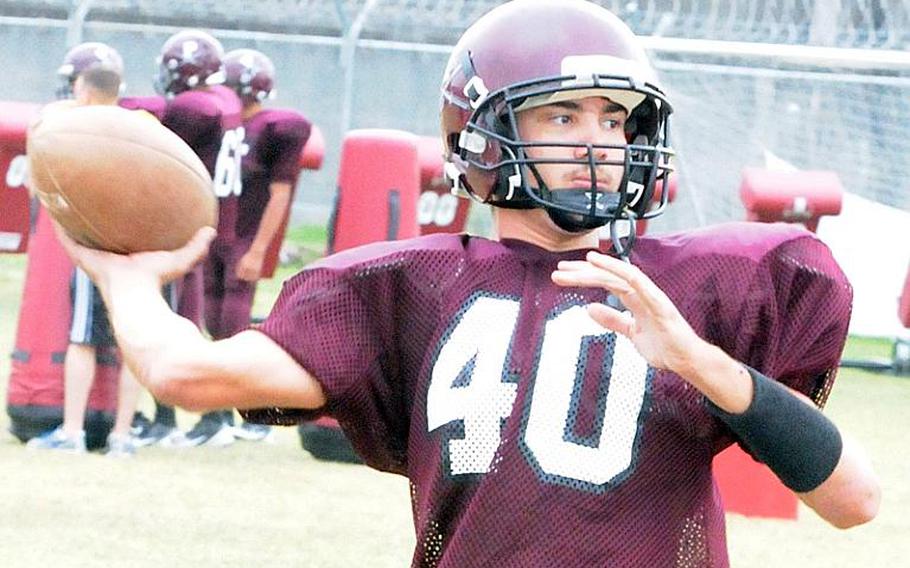
Matthew C. Perry junior varsity football senior quarterback Chris McQuillen is a former Kadena varsity player. (Dave Ornauer/Stars and Stripes)
MARINE CORPS AIR STATION IWAKUNI, Japan – Some might view moving from a varsity to a junior varsity team as a demotion. Chris McQuillen, Russell Graham, Connor Hadlock, Charlie Van Allen and Jarrell Davis see it quite differently; they call transferring from their old varsity programs to Matthew C. Perry’s fledgling program as part of “building a legacy.”
Football is back at Iwakuni after an eight-year absence. While missing (kind of) their varsity playing days, each says they’re proud to be part of building something bigger than them all. Not just building a team, but future productive citizens and something around which the community can rally.
“I’m part of what starts it back up and be called a Perry Samurai football player; only 21 people can say that,” said Hadlock, a senior transfer from Richlands, N.C. and one of five Samurai who’ve ever played football before.
He’s joined by McQuillen, formerly of Kadena; fellow seniors Graham (Chicago) and Van Allen (Hawaii) and sophomore Jarrell Davis (North Carolina), plus transfer coach Frank Macias (seven years at Mannheim, Germany) as part of the building process. The other 17 players are new to football.
New Perry principal Lorenzo Brown hopes that the rise of football at Iwakuni will signal a turnaround in the culture at the school and in the community.
“If it’s a vibrant program and it’s a big deal to this base, there’ll be a new level of excitement in the community which coincides with a change in the culture,” Brown said. “It’s very positive for the community.”
Macias “has the right temperament and assets, he’s meticulous about coaching and he knows what he’s doing. I hope he’s in it for the long haul.”
Hard work, discipline, behavior in the home, classroom and community, even a dress code for road trips are a few of the program’s underpinnings, Macias said. “We’re building people. I believe we represent the community. Football is a vehicle to teach life skills, life values, teamwork. Character is built every day,” Macias said.
They practice on the school’s newly refurbished football field, with makeshift goalposts reinforced by soccer net framing. They have gone 2-2 thus far in an six-game schedule that sees the Samurai play Zama’s and Yokota’s JV once each and Nile C. Kinnick’s twice, with two games against Japanese teams.
Macias coached a number of the Samurai last spring in baseball, when they were kept home from the Far East Division II tournament due to undisclosed code-of-conduct violations.
“Their teachers tell me that these aren’t the same kids this fall,” Macias said. “The discipline and personal responsibility has permeated the character of the team. It’s a work in progress, but we’ve made great strides.”
The veteran players have also made strides in leadership roles, Macias said.
“I’m trying to have fun with the seniors and teach the younger kids and be a mentor to them,” said Davis, a wingback-linebacker. “How not to be afraid of contact, hit before you get hit, trying to pass stuff like that down.”
“I just wish I’d been here sooner to be more a part of it,” Graham said.
The veterans’ influence is rubbing off on the rookies. “Leadership skills and determination,” freshman T.J. Jones said. “The hard work we put in helps us overcome the talent that other schools may have, if we put our minds to it.”
The first Samurai team formed in 1996 as a senior youth services team under former Perry educator Richard Elliott. They played their best ball in 1998 (5-2) and ’99 (7-1), the years before becoming a DODDS program. But when Elliott transferred to Europe, interest dwindled and the team suspended operations after the 2003 season. They went 24-32 in eight seasons.
How soon does Macias see a return to varsity status? He compared his building project to the delicatessin man cutting bologna, “a slice at a time,” meaning perhaps the 2014 season.
More than seeing how well the program gets off the ground, the current Samurai veterans are optimistic about the Samurai’s future.
“That’s what I’m looking forward to seeing,” said McQuillen of the possibility of him joining the military and coming back to Iwakuni in seven years to see how the team’s doing. “Hopefully, I can come back and help coach the team.”
“We’re starting a legacy,” Hadlock said. “We look forward to seeing it get better. Only way for it to go is up.”